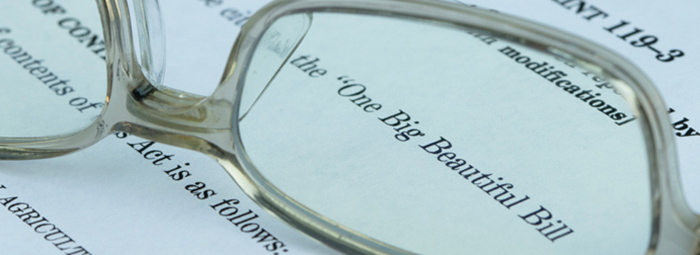
What’s in the New Tax Legislation?
Legislation signed into law on July 4, 2025, commonly called the One Big Beautiful Bill Act (OBBBA), fundamentally changed the federal tax and spending landscape. The law is so broad that this report can only summarize some key provisions that affect individuals and business owners.

2017 provisions made permanent
The OBBBA makes permanent most of the 2017 Tax Cuts and Jobs Act (TCJA) tax provisions that were set to expire this year.
- Individual income tax brackets: 10%, 12%, 22%, 24%, 32%, 35%, and 37%
- Higher standard deduction and elimination of personal exemption; 2025 standard deduction is $15,750 single or married filing separately, $31,500 married filing jointly, $23,650 head of household
- Child tax credit increased to $2,200 per qualifying child in 2025
- Mortgage interest deduction limit of $750,000 and interest on home equity loans nondeductible; mortgage insurance premiums deductible (subject to income limits) beginning in 2026
- Estate and gift tax exemption increased to $15 million in 2026 ($30 million for a married couple), indexed for inflation
- Significantly higher alternative minimum tax exemption amounts and phaseouts
Changes to existing provisions
- State and local tax (SALT) deduction increased from $10,000 to $40,000 for 2025, with incremental increases from 2026 to 2029 and return to $10,000 in 2030; cap reduced for modified adjusted gross income (MAGI) above $500,000 but is never less than $10,000
- Effective 2025, value of itemized deductions for taxpayers in 37% bracket capped at 35%
- Effective 2026, only 90% of gambling losses deductible, up to amount of gambling winnings
Green energy credits expiring
- Clean vehicle credits (new, previously owned, and commercial) are eliminated for vehicles acquired after September 30, 2025. The Alternative Fuel Vehicle Refueling Property Credit is not available for property placed in service after June 30, 2026.
- The Energy Efficient Home Improvement Credit and Residential Clean Energy Credit are eliminated for property placed in service after December 31, 2025. New Energy Efficient Home Credit expires June 30, 2026.
New provisions
The following provisions are effective for tax years 2025 to 2028.
- A new deduction of $6,000 is allowed for each senior age 65+, in addition to the standard deduction, which includes an extra $2,000 for single filers age 65+ and $1,600 each for joint filers. For example, a married couple who are both 65+ would receive a total 2025 deduction of $31,500 (married filing jointly) + $3,200 (additional standard deduction for joint filers 65+) + $12,000 (new deduction for two people 65+) = $46,700. The new deduction phases out at MAGI over $75,000 ($150,000 for joint filers).
Note: The OBBBA did not change the rules for taxing Social Security benefits, but the new senior deduction is likely to reduce the number of people who pay taxes on their benefits and reduce the marginal rate for many of those who do pay taxes. - Tips are excluded from income up to $25,000 for each individual, with a phaseout at MAGI over $150,000 ($300,000 for joint filers).
- Qualified overtime pay is excluded from income up to $12,500 ($25,000 for joint filers); phaseout at same levels as tip income.
- Interest on auto loans for qualifying new personal vehicles assembled in the United States can be deducted up to $10,000, with phaseout at MAGI over $100,000 ($200,000 for joint filers).
The following provisions are effective beginning in 2026.
- Cash contributions to a qualified public charity can be deducted without itemizing deductions up to $1,000 ($2,000 for joint filers). Higher contributions require itemization and can only be deducted above 0.5% of adjusted gross income.
- Effective July 4, 2026, a new tax-deferred investment account for children allows parents, relatives, and others to contribute a total of $5,000 annually (indexed for inflation); for children born 2025 to 2028, the federal government will contribute $1,000 “seed money.” Personal contributions are not tax deductible, but contributions by employers, charities, and state and local governments are tax-free. Distributions are taxed as ordinary income, with rules and penalties similar to traditional IRAs.
Business provisions
- The 20% qualified business income (QBI) deduction is made permanent, with a new $400 minimum deduction for certain taxpayers having at least $1,000 QBI.
- 100% “bonus” first-year depreciation is allowed for qualifying business property acquired after January 19, 2025.
- For business property placed in service in 2025 or later, the limit for expensing under IRS Section 179 is increased to $2.5 million, with phaseout threshold increased to $4 million.
Adding to the deficit
The nonpartisan Congressional Budget Office (CBO) estimated that the OBBBA will add $3.4 trillion to the budget deficit over the next decade. This includes a decrease in federal tax revenue of $4.5 trillion partially reduced by a decrease in direct spending of $1.1 trillion, primarily in reduced support for Medicaid, Affordable Care Act health plans, food stamps, education, and green energy. The estimate begins with the CBO budget baseline of January 2025, which assumed that all provisions of the 2017 TCJA that were scheduled to sunset — some of which had bipartisan support — would be allowed to expire.1
By any measure, the law is likely to add significantly to the deficit, increasing interest payments on the national debt. It remains to be seen how this added fiscal burden, along with economic stimulus through new tax breaks and reduced federal spending on social and environmental programs, will impact the U.S. economy.
Projections are based on current conditions, subject to change, and may not come to pass.

